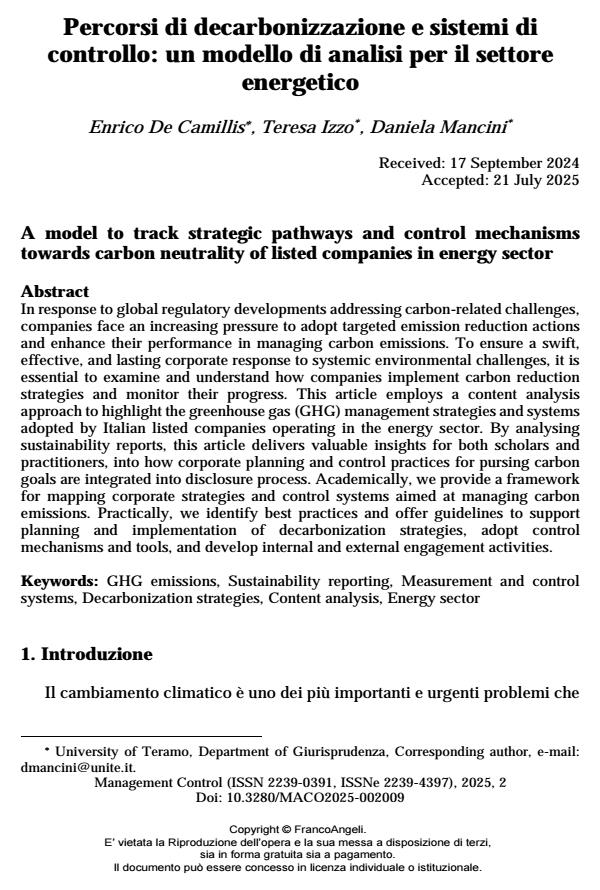Percorsi di decarbonizzazione e sistemi di controllo: un modello di analisi per il settore energetico
Titolo Rivista MANAGEMENT CONTROL
Autori/Curatori Enrico De Camillis, Teresa Izzo, Daniela Mancini
Anno di pubblicazione 2025 Fascicolo 2025/2
Lingua Italiano Numero pagine 26 P. 179-204 Dimensione file 168 KB
DOI 10.3280/MACO2025-002009
Il DOI è il codice a barre della proprietà intellettuale: per saperne di più
clicca qui
Qui sotto puoi vedere in anteprima la prima pagina di questo articolo.
Se questo articolo ti interessa, lo puoi acquistare (e scaricare in formato pdf) seguendo le facili indicazioni per acquistare il download credit. Acquista Download Credits per scaricare questo Articolo in formato PDF

FrancoAngeli è membro della Publishers International Linking Association, Inc (PILA), associazione indipendente e non profit per facilitare (attraverso i servizi tecnologici implementati da CrossRef.org) l’accesso degli studiosi ai contenuti digitali nelle pubblicazioni professionali e scientifiche.
In response to global regulatory developments addressing carbon-related challenges, companies face an increasing pressure to adopt targeted emission reduction actions and enhance their performance in managing carbon emissions. To ensure a swift, effective, and lasting corporate response to systemic environmental challenges, it is essential to examine and understand how companies implement carbon reduction strategies and monitor their progress. This article employs a content analysis approach to highlight the greenhouse gas (GHG) management strategies and systems adopted by Italian listed companies operating in the energy sector. By analysing sustainability reports, this article delivers valuable insights for both scholars and practitioners, into how corporate planning and control practices for pursing carbon goals are integrated into disclosure process. Academically, we provide a framework for mapping corporate strategies and control systems aimed at managing carbon emissions. Practically, we identify best practices and offer guidelines to support planning and implementation of decarbonization strategies, adopt control mechanisms and tools, and develop internal and external engagement activities.
Parole chiave:GHG emissions, Sustainability reporting, Measurement and control systems, Decarbonization strategies, Content analysis, Energy sector
Enrico De Camillis, Teresa Izzo, Daniela Mancini, Percorsi di decarbonizzazione e sistemi di controllo: un modello di analisi per il settore energetico in "MANAGEMENT CONTROL" 2/2025, pp 179-204, DOI: 10.3280/MACO2025-002009